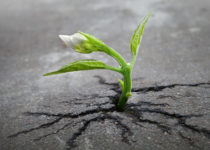Be the Master of Yourself – Part of Chapter II of the upcoming book ”Find Your Passion”

Be the Master of Yourself – Part of Chapter II of the upcoming book Find Your Passion
If you want to discover what you’re really passionate about and turn your passion into your dream career, you need to keep moving towards self-mastery. The last one is not about trying to change things that you cannot control, things that are outside of your direct influence. It’s about making the most of the resources available right now. It’s about playing your cards right, not wishing for having better cards to play. At the end of the day, your greatest available resource is your resourcefulness. Your natural ability to access and create the opportunities and resources you look for; your intrinsic capacity to play your cards well.
Is the glass half-empty or half-full? That’s exactly what perspective means as well as how you can start seeing more opportunities than excuses; doors instead of roadblocks; inspiration instead of desperation. Because opportunities are everywhere. You just need to watch carefully and with the intention to find them.
“But what does opportunity mean anyway?”, you might be wondering. When I talk about “opportunity”, I don’t just refer to financial opportunity, although it’s well included in the meaning of the word. Yes, it does mean a chance to make more money than you currently make. On the other hand, the meaning of opportunity is not limited to money. It expands to “the door to your self-worth and true potential”. That is, the chance to learn more about yourself and discover, reach, and surpass what you believe it’s possible; it’s about surpassing your potential, both personal and professional. Furthermore, it’s about realizing that what you believed was impossible is now possible.
“Opportunity is the realization that what you believed was impossible is now possible”
Opportunity is not just a way that leads you to the sense of accomplishment when you achieve a big goal of yours, such as being promoted, reach the annual income you desired, finishing a marathon, climbing to the top of mountain Everest, having the best grade in the class, etc. It’s something more. It’s the door that leads to a path of a journey. The journey you are in is always a process. During this process, you’ll be challenged constantly, facing a lot of obstacles, hardships, self-doubts, and disappointments. It is exactly in these moments when you become resilient; when you discover your true inner power. Because you simply realize that you can handle anything; no matter how hard it is or how hard it gets, you do know you’re going to make it; you do know that you’ll make it to the other side, stronger and wiser.
“Moments of crisis shall reveal your true power”
You also realize that it’s not the end of the world, as well as that how you respond to your life and circumstances is on you! Remember that life owes you nothing! Let me say that again: Life owes you nothing.
Nonetheless, if you want anything from life, go ask for it and get it! During this journey and through your hardships, you’ll discover more about yourself. As a result, you’ll start increasing your self-awareness: You’ll learn more about your interests, your values, your purpose, your vision, your strengths, and weaknesses. The more you learn about yourself, the more likely you’ll reach your true potential, and the more likely you’ll find your passion. Remember: You have greatness in you.
Given this meaning of opportunity, you’ll soon realize that it’s everywhere! This includes your future, present and past. That’s right. Do not regret, and don’t feel shame or guilt because of the past and the things you could have done differently. Because every decision you make creates for you a certain experience. And it’s this experience that will give you a lesson that you could potentially leverage in the future in order to pursue your passion and the career you genuinely love.
“You can’t connect the dots looking forward; you can only connect them looking backward.”
– Steve Jobs, 1955 – 2011, founder of Apple and pioneer of the personal computer revolution –
Steve couldn’t be more right on this. I’ll never forget when I got my first job after I graduated from Law school: Sales Associate. In my case, it was a door-to-door commission-based role. Ten hours a day, six days per week. Although I took this role because I wanted to earn more money to fund my coaching training, little did I know about the real value I got out of this experience. This realization came two years later and after the completion of my training. It was only then that I understood the value of dealing with rejection. You see, you can’t even start, even less grow, a business if you cannot sell. The same applies to landing a job. From the resume selection to your last interview you need to sell yourself. You might have heard it differently, such as ‘‘presenting”, “promoting”, “showing your value”, and the list goes on; but it’s selling. And a great lesson I took from sales, among many, was the capacity to focus on the process, not the result. In sales, rejection is the rule and you know that you have to keep on going. Because the more “Nos” you hear, the closer you are to your “Yes”. It’s a numbers game and you have to be emotionally detached from the outcome.
Needless to say, my sales experience played a tremendous role in helping me not only survive in the first years, but also grow during and despite the Covid-19 pandemic, by working with my first high-paying clients. You can’t connect the dots looking forward; you can only connect them looking backward.
Ask the right questions
So far, you must have realized that you have already leveraged opportunities in the past, although you weren’t able to connect the dots back then. But how can you start seeing more opportunities now and in the future? Ask the right questions. By “right”, I mean questions that focus on yourself and your personal growth instead of the ones that are against your potential and growth. Because not every question is powerful. Although every question you ask yourself, aloud or in your head, creates a “door” to an answer, powerful questions create doors in your mind that lead to even more doors and paths (answers) to explore! On the other hand, powerless questions create doors in your mind that lead to a dead end.
So, if you want to come up with beneficial and insightful answers, not only should you replace statements (e.g. “I know this”) with questions, but the latter ones have to be powerful. For this reason, I created the board below. It will help you understand better the distinction between powerful and powerless questions, as well as to be more intentional from now on with the questions you ask yourself.
| Powerless questions | Powerful questions |
| Why did this happen to me? | What can I do now? |
| Why did they reject me? | What new opportunities do I have here? |
| What’s wrong with me? | What can I improve? |
| Why did I fail? | What have I learned? |
| Why? | What is? |
Have you noticed that all the powerless questions start with “Why?”, whereas the powerful ones with “What”? The reason is that by asking “Why”, you give the signal to your brain to start “digging in” your subconscious mind. The problem here is that it’s not easy to be aware of what’s happening in your subconscious mind by using your conscious mind. It takes place unconsciously, so by definition, you cannot know what’s happening there. That’s also the reason why many people end up in a dead-end or they are trapped in a vicious circle of confusion, although they do their self-evaluation and the introspection necessary to improve themselves! I’m not talking about those who never take the time to assess themselves and never look for constructive feedback, operating from the belief that they’re always right. On the contrary, I refer to the courageous ones who take the time to look back and into themselves in order to improve themselves; those who are committed to constantly learning and growing. The last ones might ask “Why” instead of “What”. The result? They have more confusion than clarity, even though they had the very best intention for the exact opposite!
Replacing the “Why” with “What” can make a difference here. When you ask yourself “What made me react this way?”, instead of “Why did I react this way?”, you will create more “doors” in your mind that will lead to even more “doors” and “paths”, not “dead ends”. This way, you access what I call the “Learning” part of your brain; where your perspective shifts in two ways: 1) Neurologically, through the development of new neurons in your brain, based on powerful questions. 2) Psychologically, as your entire mindset, your way of thinking changes. You shift from a self-destructive and self-victimizing perspective to a place full of opportunities, learning, curiosity, and fun; where every experience you gain is a new page in your biography, a new book in your life library.
What to do
We’ve just seen the actions, behaviors, ways of thinking and questions you need to avoid so you can take responsibility and be in full charge of your life. We also saw a few things that would be important for you to do, and there’s more to come now! What can you do to focus on yourself and your inner world, instead of spending your focus on the outer world and things outside of your direct influence? You need to build one crucial skill: Self-mastery. It’s your capacity to effectively manage yourself and your emotions. How?
There are three simple steps for you to apply:
a) Clarify your emotions
b) Acknowledge your emotions
c) Change your emotional response
a) Clarify your emotions
No matter how ridiculously obvious it might seem to you, if you are not honest with yourself in terms of how you feel about yourself, as well as anything around you, you’ll always be a “slave” of your emotions. In other words, you’ll be reacting to them, instead of observing and mastering them. How honest should you be? We’ve already answered that, so remember: Be brutally honest to yourself. By hiding behind your finger and pretending there is no problem or a negative emotion going on, you suppress anything you feel in that moment.
“So what?’’, you might be thinking. I didn’t want to be the person to tell you this, but here it goes: You condemn yourself to a life of unhappiness and misery. It’s like trying to cover a giant hole on your floor with a big carpet. The fact that you covered it doesn’t mean it’s not there. It still is; and it’ll always be unless you do something about it; unless you take the carpet away, evaluate the importance of the damage, and start closing the hole, on your own, or with someone who can support you to do it better and faster than you.
On the other hand, if you ignore its existence, eventually you will get used to it. You will tolerate it. The result? In a single moment in time – and that’s all it takes – you won’t be attentive enough, and you will fall into the hole. The final outcome? I’ll leave the answer for this one to you.
Have you ever heard the adage “Don’t dig your own grave”? That’s exactly what you’ll do and have already done for at least once in your life. How do I know? Because every human has suppressed their emotions. Society has taught us this way. Don’t get me wrong. Hiding our emotions can be appropriate, or even necessary, in some circumstances. When you had a big fight with your partner, your family, or your loved ones in general, a few minutes or hours before your dream job interview, or your ideal client meeting, it’d be wise for you to change your mood as fast as possible to avoid messing things up.
But hiding your emotions does not mean suppressing them. You hide what you feel for a short period. You suppress when you hide what you feel for a while. For how long is it ok for you to hide your emotions? There’s no fixed period here. The sooner you acknowledge them, the better. Just a couple of days can lead to suppression, given the circumstances. Here’s the bottom line: The more you hold what you feel, the faster you’ll suppress your feelings, if you haven’t done so already.
Should you be wondering what the consequences of this suppression would be, here’s a short non-exhaustive list of them:
1) Stress
2) Worry
3) Depression
4) Emotional eating/ Obesity
5) Addictions (e.g. alcohol, drugs, sugar/junk food)
6) Insomnia
7) Poor decision-making ability
8) Heart attack/ Stroke
9) Violence (physical/emotional)
10) Sadness
11) Tiredness/ Feebleness
12) Boredom
13) Unexpected physical pain or inflammation (e.g. headaches, stomachaches, back pains, acne, rashes, arrhythmias)
Why does this happen? Because, as we already explained, your body has electric energy flowing in it. And emotions are energy in motion (e-motion). They are electric energy in your body. When you suppress them, especially the negative ones, guess where they go? They stay in your body. As a result, they create irregularities in your electric currents, which cause all the symptoms above. That’s why you might have a heart attack if there are irregularities in the electric currents related to your heart. That’s why your cardiologist will do with you an electrocardiogram (ECG or EKG). This is also a great explanation of the impact that the mind has on the body. Yes, your mind does affect your body.
Hey, I do know that it’s hard for you to be honest with yourself. We’re afraid of the shit we might discover and see. We’re afraid of how we’ll react after the new insights and what we’ll do with them. Nevertheless, it’ll be much worse if you react when your emotions are so suppressed that they become uncontrollable. Then, it’ll be too late… Remember: We can handle anything. You have the power to handle anything.
“You have the power to handle anything”
So, instead of avoiding and suppressing your emotions, simply observe them. Don’t react. Be curious about them. How? Meditation is a great method for this; and although is often related to religion, making the most of it does not turn you into a believer of any religion. It can though improve your self-mastery, exponentially. I don’t refer only to the people I’ve worked with across the world. I also refer to the surprising benefits it had to myself. Two and a half years ago, decided to start meditation. In the beginning, I was quite skeptical and reluctant about it. Needless to say that, two and a half years later, I cannot recognize myself. From feeling stressed, overwhelmed, and angry quite a few times in my day, ended up being patient, grounded, balanced, calm, focused, and even more confident than before! Because I learned to observe and recognize my thoughts and emotions without reacting to them. Couldn’t be more grateful for this transformation. Remember: Self-mastery is an never-ending journey. Just keep on traveling….
Feel free to connect with me on Facebook and LinkedIn, as well as check the upcoming book ”Find Your Passion”, by visiting my personal site JimPanos360.com


